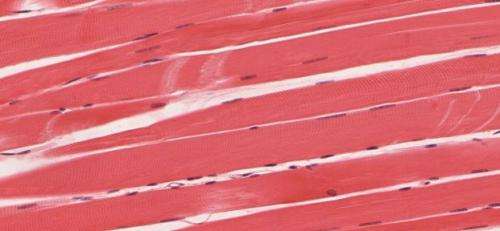Early interventions could help counteract muscle loss in sarcopenia

Weakening muscles are a natural part of the aging process, but for some people with a condition called sarcopenia, the decline is abnormally fast. A new study from Karolinska Institutet in Sweden suggests that the early stages of sarcopenia could be counteracted with timely interventions designed to preserve physical and cognitive function and manage chronic conditions. The results are published in the Journal of Cachexia, Sarcopenia and Muscle.
As we age, we start to lose muscle mass and function. When this decline is more extensive or rapid than expected, it is categorized as sarcopenia, a common condition in the elderly that often lowers their quality of life and increases the risk of falls and bone fractures.
Researchers at Karolinska Institutet have now examined how different factors such as sex, age, educational level, living arrangement, lifestyle and chronic conditions affected the development of sarcopenia in people aged 60 or over across a 12-year period. The study included over 3,200 individuals from the SNAC-K (Swedish National Study on Aging and Care in Kungsholmen) study.
At the start of the study, almost 10 percent of the participants had sarcopenia, 27 percent had probable sarcopenia and just over 63 percent no sarcopenia. Metrics such as grip strength, walking speed, speed of rising from a chair five times and calf circumference were used to evaluate muscle strength and mass and physical performance.
"Perhaps the most interesting result was that after five years, a roughly equal proportion (just over 10 percent) of the individuals with probable sarcopenia had either improved or deteriorated. This suggests that sarcopenia is a dynamic condition that is modifiable especially in the initial stages, which is a hopeful message," says the study's corresponding author Caterina Trevisan, affiliated researcher at the Department of Neurobiology, Care Sciences and Society, Karolinska Institutet.
Factors that could be associated with an increased chance of improvement and lower mortality were physical activity and higher results on cognitive tests, while a higher number of chronic conditions, male sex and older age had the opposite correlation. For individuals initially diagnosed with severe sarcopenia, the likelihood of improvement was low, and many of them died during the follow-up period (almost 71 percent).
"Our results support the need of early interventions to preserve physical and cognitive functions and manage chronic conditions in older individuals," says the study's last author Anna-Karin Welmer, senior lecturer at the Department of Neurobiology, Care Sciences and Society, Karolinska Institutet. "With these tools, we could probably counteract muscle deterioration and the impairment in quality of life this entails. We now need intervention studies to find ways to use these tools to counteract sarcopenia."
More information: Twelve-Year Sarcopenia Trajectories in Older Adults: Results from a Population-Based Study, Journal of Cachexia, Sarcopenia and Muscle (Nov. 30, 2021). DOI: 10.1002/jcsm.12875


















